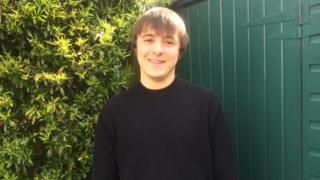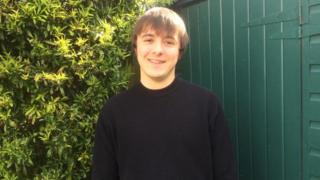Coronavirus: Dealing with addiction while in lockdown


The coronavirus lockdown has been especially tough for people in recovery from addiction because support meetings have been cancelled.
Musician Laurie Wright, 28, from Cheltenham, has been in recovery for alcohol and drug addiction for four months. Here, Laurie and his parents Carol and Richard share their experiences of life in lockdown.
The coronavirus has affected my life quite heavily because now the meetings are not in person.
In the 12-step programme you're encouraged to look for a higher power. Being an atheist, God doesn't really wash with me, so I look for a higher power in human connectivity - the spiritual human connection we get by sharing our stories with each other in person. The hugs, the eye contact, the smiles.
We do the meetings on Zoom, but it's not the same. Everyone's mic has to be muted, you can't hug each other, you can't see everyone at once.
There's also a big thing in the 12-step programme called service.
I have two service posts a week where I make the tea and greet people, which forces me to be there early. Service is a huge part of early recovery because it forces you into a meeting because everyone is relying on you.
With the lack of meetings, I don't do any service, which is an incentive to potentially miss meetings.
A few years ago, I decided I didn't want to do drugs any more and I knew in the back of my mind that the booze was also a problem. I always thought if I could quit the drugs I could just have a few pints. But that was never, ever the case.
I struggled on for another three years of doing the odd month sober. That, again, would convince me I was fine because, in my mind, if I could stop for a month then I couldn't be addicted.
That would legitimise the other 11 months of chaos.
Eventually it all got too much and it came to a head when I got kicked out of my house and my girlfriend left me, both on my birthday. Then I decided that I needed to go sober.
I didn't think I needed rehab and thought I could do it on my own. That didn't work. I was lying a lot. I'd go up north for a gig, end up getting on it and then tell everyone back home I was sober.
I finally got sober when I'd had enough and had what they call in the 12-step programme "the gift of desperation". You just go: "I can't do this on my own". It opens up the door to being honest, open-minded and willing to actually change.
If you have been affected by any of the issues raised in this article help and advice is available here
I went to rehab for a month and that was amazing. I learned about the 12 steps properly and got serious about it.
I was in over Christmas - which needed to happen. I knew what Christmas was, especially with all my mates and what is expected of me as the bringer of chaos. It would show people I was serious when I got out.
But it's not rehab that will keep you sober, it's rehab that will take you out of the situation.
The meetings were my saving grace, by having them to go to every single day. It's not even a chore once you get into it, listening to other people's stories.
I've always said it's like different chapters of the same story, hearing everyone else's struggle, because we all have the same obsessive-compulsive nature. For most addicts, the meetings are their saviour.
Obviously the meetings have stopped due to the coronavirus and have gone online.
Although I'm on my phone all the time, I don't do enough online meetings because it's just not the same.
But through not doing meetings, your addict brain starts to convince yourself that you're alright, which then leads to thoughts of "I can have a drink", which can obviously then lead to relapse.
There's a WhatsApp group we have, which is a gratitude list. So every morning and every night everyone says what they're grateful for - like being sober, or a conversation you had with your parents, or a song you heard.
This is really telling - everyone apart from a couple of people out of loads have dropped off.
Isolation is a huge part of that because we talk about isolation in the meetings as a negative thing. Now we're being forced to isolate you can see the natural progression. People are losing the plot.
I daydream quite a lot anyway but situations will arrive in my mind of being on tour and of just being able to drink and it will all be absolutely fine.
And it probably would be for the first bit, actually probably the duration. I'd maybe get away with it. But no, hang on, that's where the addict brain starts to take over. You convince yourself that that would be alright, but it's not.
I've let those thoughts stew for too long on a few occasions. Those situations have arisen in my mind where I've thought maybe I can drink and take drugs again. Maybe this is all smoke and mirrors?
But it's not the case. It's been a lot harder not having the meetings to talk about things like that.
There have been some good things to lockdown.
Simple things like I've been doing a lot of cooking, learning to use the kitchen with mum, which is nice. We're not arguing as much now.
I'm writing a lot of music and I had a tour cancelled as well so I've just started going live online every night and playing. I also released my EP. If anything, it has made me more productive.
I have huge fears about the end of lockdown because it will be such an exciting time, especially being a musician, because people will come in large attendance to the gigs.
Yes, everyone drinking and doing drugs around me will be difficult - but the meetings will help.
Being able to see my sponsor at meetings and see my other friends in recovery and meeting new ones will help.
The meetings will keep me clean.
Richard Wright, father
There was a real flashpoint between him and Carol because he wouldn't accept his mum's point of view during an argument.
He put his head in his hands and he said: "I can't understand where this is coming from. I don't see myself as an angry person but I don't get any opportunities to go to the meetings or to speak with people who have gone through similar problems to me."
He is definitely missing the meetings.
It was a good move when he got his Facebook and Instagram live shows going. He came out of those three hours with a lot of adrenaline going through him which was really good because during the day he can be very static.
I wouldn't be being honest if I said I wasn't a bit concerned about Laurie after lockdown ends, but I suppose there were similar worries after he left rehab.
The first thing he did after rehab was to go down the pub to meet his mates, which we were really worried about. He spent the evening on non-alcoholic drinks and people were doing drugs in the toilets. He said it bothered him a bit but he saw himself through it.
Carol Wright, mother
After the meetings ended he told me he was starting to self-doubt and wasn't sure if he could do it, but that only lasted a couple of days and it was good he could say that to me. Since then he's been brilliant.
He's got completely engrossed with his music. But the spin-off to that is that he's been on his phone all the time looking at what people think and I think that is a concern.
I think it would be better if he did the online meetings and communicated with his sponsor rather than spending time looking at what people he doesn't even know think.
A spokesperson for Alcoholics Anonymous said online meetings or phone calls can be arranged between friends or sponsors to help people maintain their sobriety during self-isolation.
"Many members are continuing the AA spirit of service, with telephone and email responders and the Chat Now service continuing to talk to people looking for recovery and pointing them in the direction of meetings," the spokesperson said.
Since the beginning of March, calls to the AA helpline have gone up by 22%, and use of its chat service has increased by almost a third.
Interviews by George Wright, Laurie's brother
If you have been affected by any of the issues raised in this article, you can contact www.alcoholics-anonymous.org.uk or call 0800 9177 650. Help and advice is also available here
 Pathways Drug Rehabilitation Luxury Addiction Treatment & Detox Center
Pathways Drug Rehabilitation Luxury Addiction Treatment & Detox Center


